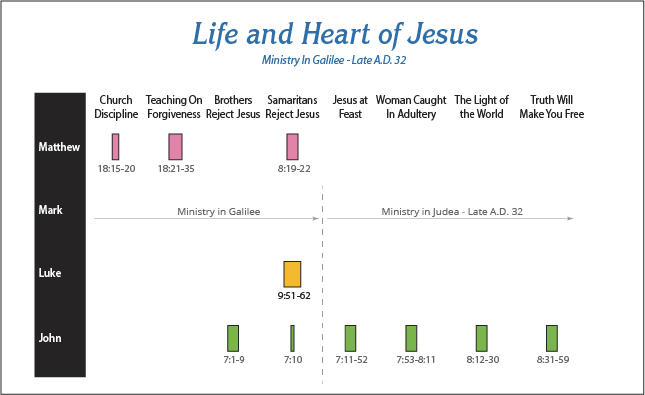On one occasion a man stated that when someone offends him he does not forgive them until they apologize to him. As he was talking he remembered an occasion when he had been offended and his facial expression changed. He was struggling with the idea of just forgiving those who offend him. He said that he followed Jesus’ example. He reasoned that God does not forgive until we confess our sins. Some Christians quote Matthew 18:15 from the King James Bible which reads, “If your brother sins against you, go and tell him his fault . . .” They believe this verse supports their refusal to forgive someone who has offended them until an apology is given. But does the KJV translation of this verse accurately reflect what Jesus said? Further, does it agree with Matthew 18:21-35 and Luke 17:3-4? Is it consistent with the apostle Paul’s encouragement to avoid bitterness (Ephesians 4:31)? What about Matthew 6:13 where Jesus taught, “. . . if you do not forgive others your heavenly Father will not forgive your transgressions.” I hope you are thinking now. Our study is about forgiveness.
The Background
Our last three studies have been about rescuing a sinning Christian from an ongoing pattern of sin. First, Jesus encouraged us to help other Christians who have stumbled because they were offended or because they committed some major sin or are committing an ongoing sin. He told us the individual is so important that if necessary we must leave all the other ninety-nine sheep in order to go after just one straying Christian.
Then in the second study, Matthew 18:15-17, Jesus focused on the straying Christian who is in sin. That passage describes the process of church discipline. In the third study, Matthew 18:18-20, Jesus told us that heaven supports the church discipline process when it is followed as He described. We do not need to worry that God is not supportive.

Every Little Offense
Then Jesus answered the question, “What should we do when someone sins against us personally?” That is, you have been offended one-on-one? Do we pursue church discipline, getting others involved, even the church leadership? I can imagine someone wanting to use the process of church discipline to punish those who offend for every personal offense.
Some individuals react to every petty offense. If church discipline was executed for every petty offense, the church would be a miserable place. I would not want to attend such a church, nor would I want to associate with someone who was offended by every little imperfect action or word that others committed. Such a person has a log or beam in their eye. Jesus described this type of person in Matthew 7:3-5,
Why do you look at the speck that is in your brother’s eye, but do not notice the log that is in your own eye? Or how can you say to your brother, ‘Let me take the speck out of your eye,’ and behold, the log is in your own eye? You hypocrite, first take the log out of your own eye, and then you will see clearly to take the speck out of your brother’s eye. Matthew 7:3-5 (NASB)
Someone Offends You
Now let’s be practical for a minute. What should a Christian do when someone offends them, personally? Jesus give us the answer in the verses following His teaching about church discipline. Peter asks what shall we do when we are personally offended.
Then Peter came and said to Him, “Lord, how often shall my brother sin against me and I forgive him? Up to seven times?” Matthew 18:21 (NASB)
It is important to notice that Peter’s question reveals that Jesus had not yet discussed the idea of what we should do if we are personally offended. Peter introduces the idea of what to do if someone sins against another person. Some Christians say that Matthew 18:15 teaches that church discipline should be employed if someone sins against us. If that is true, then do we follow Jesus’ teaching in Matthew 18:15-17 or Matthew 18:21-22 when we are offended by someone? Which one do we follow when we are offended? This is an important point to understanding the two passages. The short answer is that Matthew 18:15 is about non-personal offenses and Matthew 18:21-22 is about personal offenses.

In our study of Matthew 18:15-17 we discovered that Jesus’ teaching about church discipline was general in nature. It was about a Christian who had sinned or was habitually committing a sin. The study was titled Church Discipline – Rescuing Sinning Christians. Jesus did not teach us to confront someone when we have been personally offended. In that study, we discovered that the phrase “against you” (v. 15) is not in the better manuscripts and should not be included in the Bible translations. Also, the summary statement about church discipline in Luke 17:3 does not include the phrase “against you,” but Luke 17:4 does include the phrase. It is a parallel teaching to Matthew 18:21-22. That is, both Matthew 18:15-17 and Luke 17:3 are about church discipline and Matthew 18:21-22 and Luke 17:4 are about personal offense.
Now we return to the discussion between Peter and Jesus about forgiving “up to seven times.” Why did Peter suggest forgiving another person seven times? The religious leaders of Jesus’ day taught that one did not have to forgive an offender more than three times.[1] Apparently, Peter is trying to be generous by suggesting seven times. Now notice that Jesus does not tell Peter to perform church discipline.
Jesus said to him, “I do not say to you, up to seven times, but up to seventy times seven.” Matthew 18:22 (NASB)
Instead, Jesus says to forgive the offender not three times, or seven times, but seventy times seven. Jesus rejected the teaching of the religious leaders. They taught a person was obligated to forgive “no more than three times.” That is, you had to forgive at least three, but after that you could stop forgiving on the fourth offense and reject them. But Jesus said forgive seventy times seven or four hundred and ninety times. He made the number high in order to make a point. He was saying just keep forgiving. Never stop!

Parable On Forgiveness
Then Jesus illustrated the principle of forgiving someone seventy times seven with a parable in Matthew 18:23-35.
For this reason the kingdom of heaven may be compared to a king who wished to settle accounts with his slaves. When he had begun to settle them, one who owed him ten thousand talents was brought to him. Matthew 18:23-24 (NASB)
In the parable we are told that the king had a number of debtors who owed him money. We can imagine that some debtors were able to pay and others couldn’t. Some debtors begged for forgiveness and others didn’t. Then he encountered one debtor who owed him the astronomical amount of ten thousand talents. A talent was equal to about 6,000 denarii.[2,3] Consequently, his debt of ten thousand talents was equal to sixty million denarii. According to Matthew 20:2 a denarius was a day labor’s wage. That means the debtor owed the king sixty million days of labor at a day labor’s wage, or 164 years and two months of labor.[4] Grant Osborne has estimated that sixty million denarii would be equal to $9.6 billion dollars, if gold was $1,000 an ounce.[5] Josephus, the Jewish historian, indicates that 600 talents was the amount collected in taxes from all of Judea and Samaria in 4 B.C.[6,7] Ten thousand talents was an extremely large debt. Jesus used this excessively large number in the parable in order to make the point that the man could never payoff the debt. The debtor would have known that he could never pay it off. What did the debtor in the parable do? The next two verses give us the answer.
But since he did not have the means to repay, his lord commanded him to be sold, along with his wife and children and all that he had, and repayment to be made. So the slave fell to the ground and prostrated himself before him, saying, “Have patience with me and I will repay you everything.” Matthew 18:25-6 (NASB)
The king had decided to sell the debtor, his entire family and everything that he had in order to at least partially pay the debt. In response the debtor begged for mercy and lied saying that he would pay it off, but he couldn’t and the king knew he couldn’t.
And the lord of that slave felt compassion and released him and forgave him the debt. Matthew 18:27 (NASB)
But because the king felt compassion for the man he forgave the debt.
Have you ever been offended by someone and a little thought in your mind said, “I will never forgive _____”? The hurt was so great or the loss was so significant that you could not forgive the person? The debt was ten thousand talents and you did not want to forgive?
If I had been the man in the parable I would have rejoiced and thanked God. But what did the man do in Jesus’ parable? Verse 28 tells us.
But that slave went out and found one of his fellow slaves who owed him a hundred denarii; and he seized him and began to choke him, saying, “Pay back what you owe.” Matthew 18:28 (NASB)
Now one hundred denarii is about three months of debt. This is a significantly small amount compared to what the first debtor owed. One would think that he would have been compassionate and merciful like the king, but he wasn’t.
So his fellow slave fell to the ground and began to plead with him, saying, ‘Have patience with me and I will repay you.’ But he was unwilling and went and threw him in prison until he should pay back what was owed. Matthew 18:29-30 (NASB)
The fellow slave pleaded for mercy just like the first slave did. In fact, he dropped to the ground and begged for mercy. The first slave revealed his rotten heart when he refused to forgive such a small amount and imprisoned his fellow slave until he could pay. The first slave loved to receive mercy but he did not want to give mercy.
Unfortunately, some Christians are unforgiving just like the first slave. They are unwilling to forgive small debts – offenses. One year our church was in the process of accepting nominations for church leaders for the next year. In our church, the prospective church leaders or elders were publicized so that the entire congregation knows who are being considered. Then those who attend the church can raise objections if they believe they have a valid reason why the person is not biblically qualified to serve. Subsequently, a woman approached me and told me that she objected to one of the nominees serving as an elder because he had bumped her in the middle aisle of the church sanctuary before the service began. Upon being questioned, she eventually admitted that it was possible that the man did know he had bumped her. The man had been hurrying to help someone. Yet, she was unforgiving saying, “He should known that he had bumped her and apologized.” Now that is a petty, unforgiving attitude. Her husband was a leader in the church. Wow, she sure had an unforgiving heart! That is just like the first debtor.
Then we are told the debtor’s fellow slaves were greatly grieved because of the petty heart.
So when his fellow slaves saw what had happened, they were deeply grieved and came and reported to their lord all that had happened. Then summoning him, his lord said to him, “You wicked slave, I forgave you all that debt because you pleaded with me. Should you not also have had mercy on your fellow slave, in the same way that I had mercy on you?” And his lord, moved with anger, handed him over to the torturers until he should repay all that was owed him. Matthew 18:31-34 (NASB)
The king was upset too! As a result, the debtor was cast into prison until someone could pay all of the debt.
The parable is a rebuke to petty, unforgiving hearts and motivates us to forgive those who have offended us so greatly that they could never pay us, even if they desired. That is the message of the parable.
My heavenly Father will also do the same to you, if each of you does not forgive his brother from your heart. Matthew 18:35 (NASB)
Jesus final words are an encouragement to forgive offenders from our heart. We should be eager to forgive. Now there are many applications that have been proposed by teachers, but let’s be careful to not miss Jesus’ application. Peter had just suggested forgiving offenders seven times, but Jesus said that we should forgive 490 times, an extreme number of times – just like ten thousand talents was an extreme number. The parable is about a forgiving heart and not one that keeps track of offenses up to three times then stops forgiving. Jesus forgiveness should be the characteristic of our hearts. What is you heart like?

Unconditional, Unilateral Forgiveness
Jesus taught about forgiveness on other occasions also. Check out Mark 11:25.
Whenever you stand praying, forgive, if you have anything against anyone, so that your Father who is in heaven will also forgive you your transgressions . . . Mark 11:25 (NASB)
Did you see the phrase “against you”? Jesus is referring to someone who has offended you just as He did in Matthew 18:21 and Luke 17:4. The Greek word in Mark 11:25 that is translated as “praying” is a participle. That means Jesus is saying that while you are praying you are to forgive. You are not to wait. John MacArthur adds,
There is no mention of confrontation. There is no command to seek the offender’s repentance. The forgiveness of Mark 11:25 is therefore different from the forgiveness of Luke 17:4. This forgiveness is to be granted unconditionally and unilaterally.
Now imagine that you are praying and remember that you have not forgiven someone because they did not apologized or asked for your forgiveness. What are you supposed to do? Should we withhold forgiveness until they come begging? What kind of forgiving heart is that? Jesus’ teaching is very clear. If you want God to listen to you, forgive them. That means you must forgive them even if they did not apologize or ask for your forgiveness. Otherwise, God the Father will not hear you!
In Matthew 6:14-15 Jesus teaches the same principle,
For if you forgive others for their transgressions, your heavenly Father will also forgive you. But if you do not forgive others, then your Father will not forgive your transgressions. Matthew 6:14-15 (NASB)
The principle is that we are to unconditionally and unilaterally forgive any offender, that is, anyone who sins against us. We are not to wait for the person to apologize or beg for our forgiveness as some individuals teach today. That would be just like the Pharisees after the third offense. Forgive three times but not on the fourth and the following offenses. Jesus says that if we do not forgive those who offend us God will not forgive you and He will not listen to your prayers. Now that is motivation to forgive unconditionally and unilaterally. Who wants their prayers “bouncing off the ceiling?” Now if we connect Jesus teaching with Psalm 66:18 and James 5:16-18 we discover that one who does not forgive is an unrighteous man or woman since God listens to the prayers of a righteous person.
What should you do if you have offended someone? Jesus also gives you instruction in Matthew 5:23-26.
Therefore if you are presenting your offering at the altar, and there remember that your brother has something against you, leave your offering there before the altar and go; first be reconciled to your brother, and then come and present your offering. Matthew 5:23–24 (NASB)
Now think about your last argument in which you got angry. That is, you were offended so you got angry and in the process you offended the other person. What should you do? First, confess your sins to God, otherwise, He will not hear you. Second, forgive the other person unconditionally and unilaterally without speaking to, chastising or rebuking them. Third, go and apologize because you offended them. What if the person never apologizes or asks for your forgiveness? Forgive them! God does not tell us to go and rebuke them for not forgiving us.
Examples of Forgiveness
A man once told me that he forgives others like Jesus does. He waits until someone confesses their offense and apologizes. His reply revealed an unforgiving heart. He was not like the king who willingly forgave from the heart. He did not follow Matthew 6:14-15. Therefore, his sins were not forgiven.
He was not like Jesus Christ on the cross who forgave those who had Him crucified or the crowd that was mocking Him while He hung dying on the cross. Do you remember what Jesus did while on that cross?
But Jesus was saying, “Father, forgive them; for they do not know what they are doing.” And they cast lots, dividing up His garments among themselves. Luke 23:34 (NASB)
This verse reveals Jesus’ forgiving attitude. Jesus forgave those who had not apologized or asked for forgiveness. Jesus modeled the forgiving heart that God wants you and I to have. Our forgiveness does not result in eternal life. We cannot provide that type of forgiveness. The best we can do is to forgive from the heart. That was Jesus’ example on the cross for us.
Stephen, the first Christian martyr, followed Jesus’ example of forgiveness in Acts 7:60. While he was being stoned to death, Stephen asked God to forgive them. Clearly, those stoning him were not apologizing or asking for forgiveness. In fact, they thought they were serving God.
They went on stoning Stephen as he called on the Lord and said, “Lord Jesus, receive my spirit!” Then falling on his knees, he cried out with a loud voice, “Lord, do not hold this sin against them!” Having said this, he fell asleep. Acts 7:59-60 (NASB)
Paul also modeled forgiveness from the heart when asked a slave owner, Philemon, to unilaterally and unconditionally forgive a slave, Onesimus, who had run away. The slave was not apologizing or asking for forgiveness. Instead the apostle asked Philemon to “charge” his offense to his account.
If then you regard me a partner, accept him as you would me. But if he has wronged you in any way or owes you anything, charge that to my account . . . Philemon 17–18 (NASB)
Conclusion
In Ezekiel 33:7-8 God warns us to help those fellow Christians who have committed some major sin or are habitually committing some sin. God was not encouraging us to confront others over every petty, little sin. Otherwise, we would be endlessly confronting everyone around us because we are all sinners. Further, life would be miserable with such people. Also Galatians 6:1 tells us that any confrontation must be performed in a spirit of gentleness. If someone is offended by another Christian’s sin, then it is very difficult for that someone to be the person who tries to help the sinning Christian. In fact, it is almost impossible due to the conflict that occurred between the two individuals. The church discipline process outlined in Matthew 18:15-17 describes how we can help a sinning Christian, where the offense is not against us.
In Matthew 18:21-35 Jesus describes what to do when the offense is against us personally. We are to forgive from the heart and let it go just as Jesus, Stephen and Philemon was encouraged to do. Before we conclude, I need to ask you, “Is there someone whom you need to forgive unconditionally and unilaterally from the heart?”
References:
1. “R. Jose b. Hanina said: ‘One who asks pardon of his neighbor need do so no more than three times . . .'” Babylonian Talmud, Yoma. 86b, 87a.
2. Grant Osborne. Matthew. Exegetical Commentary on the New Testament. Zondervan Publishing. 2010., p. 694.
3. Kenneth Bressett. Money of The Bible. Whitman Publishing. 2013, p. 25.
4. If one multiplies 10,000 talents by 6,000 denarii/talent the product is 60,000,000 denarii. Then if we divide 60,000,000 by 365 days/per year the result is 164 years and two months.
5. Ibid.
6. Ibid.
7. Antiquities of the Jews. 17.320.